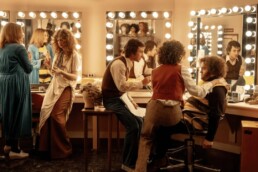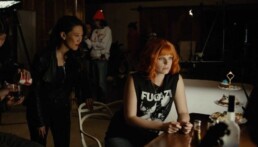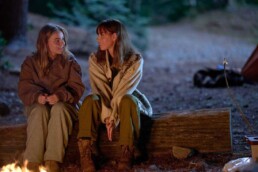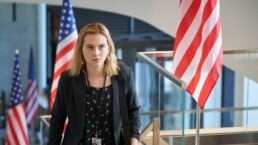'Saturday Night' Review: This Comedy of Errors Deserves a Standing Ovation
In his latest film Saturday Night, director Jason Reitman reminds us why we should all want to stay in on the weekends. Re-tracing the chaotic hour and a half before the live airing of NBC's inaugural episode of SNL, Saturday Night is a full-throttle, non-stop whiplash of hilarity and hijinks. Be prepared to laugh so hard it hurts as you relive one of TV's most historic and hectic nights.
The Countdown to a Riotous Revolution
Nearly 50 years ago, a young group of misfit comedians and writers changed the trajectory of television forever. Saturday Night begins at 10:00 pm, when Lorne Michaels (Gabriel LaBelle) arrives at 30 Rockefeller Center for the final dress rehearsal of his new show. Immediately, chaos envelops him. There's a llama in the loading bay, John Belushi still hasn't signed his contract, the stagehands are stoned, scripts are being neutered by the NBC compliance officer, and the lighting director just quit. To put it mildly, it's a disaster.
To top it off, the cast is out of control. The combined untamed energy of Chevy Chase (Cory Michael Smith), Dan Aykroyd (Dylan O'Brien), Gilda Radner (Ella Hunt), Jane Curtin (Kim Matula), Laraine Newman (Emily Fairn), Garrett Morris (Lamorne Morris) and John Belushi (Matt Wood) is enough to make Lorne combust with anxiety. But there is not enough time to panic. With NBC executive David Tebet (Willem Dafoe) expecting perfection and rival funnyman Johnny Carson (voiced by Jeff Witzke) expecting failure, Lorne Michaels can only do one thing: trust his instincts. And right now, his instincts are telling him that this ragtag troupe of performers will somehow be able to pull it all together just before the clock strikes 11:30 pm.
Pitch Perfect Casting Brings This Biopic to Life
An accurate recounting of true events, Saturday Night is a phenomenal showcase of cinematic symbiosis firing on all cylinders. This historical biopic is not a deep dive into any particular character, not even creator and showrunner Lorne Michaels. Saturday Night is a true ensemble comedy that runs like a well-oiled, coked-up machine. Sure, the hyperbolic moments are exaggerated, but then again, so was the real-time activity taking place in Studio 8H of 30 Rock.
The film's biggest selling point is, without a doubt, the cast. When taking notes during the screening, there were multiple points when I hurriedly jotted down "SPOT ON" when commenting on Gilda's hairstyle, Belushi's eyebrows, and Chevy's tonal inflection. How casting director John Papsidera found these up-and-coming actors who can fully (and I mean fully) embody these comedy legends is nothing short of a perfect match. In addition to the main SNL cast, notable standouts include Nicholas Braun's portrayal of both Andy Kaufman and Jim Henson, Rachel Sennott as Rosie Shuster, and Nicholas Podany as Billy Crystal.
Set to an electrifyingly uptempo and jazzy score by Jon Batiste, who also has a cameo role as the show's first musical guest Billy Preston, the soundtrack is a key component to Saturday Night's identity. It's no surprise that the score is heavily influenced by the SNL stage band. The music's bright saxophone and larger-than-life percussion act as the film's heartbeat throughout. The artisanship in front of and behind the camera is on full display here. The incredible casting and the zingy one-liners are outstanding achievements that make this film an unmissable watch.
Takeaway
"What kind of name is Saturday Night?" the puzzled NBC executive asks Lorne Michaels, noting the seemingly bland choice for the series title. However, director Jason Reitman is more keen on answering a different question: What kind of feeling is Saturday Night? Saturday Night is an homage to the spirit of creating art for art's sake and a testament to the freedom of expression. Despite the SNL we know today feeling lightyears away from the scrappy, turbulent, and drug-riddled frenzy it originated as, it continues to remain a place for the misfits to call home. And as an SNL fan let me tell you, there's no place like home.
'Bananahead' Review: An Aspiring Actor Falls Into a Stylish Fever Dream
An aspiring actor ends up starring in her own living nightmare in the horror short film, Bananahead. Selected to screen at the 2024 HollyShorts Film Festival, Bananahead comes from the mind of writer-director Christopher Greenslate. Inspired by personal conversations he had when meeting lead actor Sally Maersk, Greenslate tackles the theme of toxic expectations, a prevalent occurrence within the pressure cooker in the Hollywood film industry.
Following in Her Mother's Mysterious Footsteps
Andi Sanger (Maersk) is an aspiring actor whose reputation precedes her. The daughter of a famous author who mysteriously disappeared two years ago, Andi understands that, while she may get attention from her last name, her talent is what will ultimately book her roles. Luckily, there is one upcoming audition she knows she will nail. It's the lead in the film "Bananahead", a feature adaptation of her late mother's bestselling book.
Andi's audition comes at a busy time in her life. She is also in the middle of renovating her grandmother's house, which she has recently moved into with her boyfriend. One night, Andi stumbles upon a mysterious room that seems to turn her manifestations of fame and stardom into reality. This room is a fantasyland that plays out her deepest desires. Andi watches in awe, as she witnesses the life she's dreamed about. But then, she wakes up.
Life continues to go on as normal. That is, until Andi starts having bizarre night terrors and unexplainable sickness. When she initially entered the mysterious room, Andi was amazed that she could see her future playing out in front of her. But she soon realizes that by unlocking this dream scenario, she has also unlocked a haunting legacy, a psychodrama wherein she's the lead, and also may not survive.
A Stylish, 24-Minute Psychological Horror Film
Bananahead is an ambitious psychological horror film that does the most with its runtime and leading actor. Sally Maersk takes on many different roles and her performance is charged and captivating in each one. From a craft perspective, deciding to transition from square 1:1 framing to horizontal 16:9, once Andi enters the mysterious room, is a creative choice that serves the story well. At the same time Andi enters this new dimension, so does the audience. Director Christopher Greenslate also plays around with color in fresh ways. The mysterious room enlists pastel hues of orange and pink pastels while the moments on the "Bananahead" film set are captured in black and white.
Takeaway
A stylish fever dream inspired by common experiences between creatives, Bananahead is a cautionary tale about chasing fame and the expectations of one's legacy.
'My Old Ass' Review: A Mushroom Trip Leads to an Uncanny Discovery
In 2021, Megan Park made her directorial debut at SXSW with The Fallout. The drama, starring Jenna Ortega and Maddie Ziegler, went on to win the festival's top honor, the Grand Jury Prize for Narrative Feature. Three years later, Park returns with another festival darling in her sophomore film, My Old Ass. Featuring a delightfully deadpan Aubrey Plaza and rising star Maisy Stella, My Old Ass premiered at the 2024 Sundance Film Festival to near-universal audience admiration before it was acquired by Amazon MGM Studios for $15 million.
A Life-Changing Mushroom Trip Leads to an Uncanny Discovery
Elliott (Stella) is counting down the last days of summer at home before relocating to the big city for college. On the evening of her 18th birthday, Elliott and a couple of friends celebrate her impending adulthood by camping. They bring with them a plastic baggie of mushrooms that are all but guaranteed to induce a psychedelic trip. Elliott doesn't immediately feel the effects and is convinced she is immune to the drug. That is until she comes face to face–literally–with her future self. Sitting next to 18-year-old Elliott is 39-year-old Elliott (Plaza), whose words of wisdom and foreboding messages about what to expect in her future become all too much.
Watch My Old Ass here.
Both intrigued and horrified, Elliott eventually begins to humor her future self's warnings, whom she endearingly calls her "old ass". The most simplistic of the requests: stay away from a boy named Chad. It seems easy enough. But when she eventually bumps into a tall, blonde-haired, blue-eyed stranger who introduces himself as Chad (Percy Hynes White), her intentions get muddy with desire. Everything becomes complicated until Elliott comes to the realization that she only has one life, and she wants to live it to the fullest.
A Modern-Day Coming-of-Age Story
My Old Ass has many classic coming-of-age tropes that audiences will find comforting, like the journey of self-discovery and the butterflies of a first love. The film strikes the right balance between these nostalgic moments and more progressive themes, like navigating a fluid sexual identity. Director Megan Park crafts an honest, heartfelt story that also encapsulates a sense of freshness. The film's comedic leanings offer a charming examination of young adulthood.
Maisy Stella commands the screen as the angsty adolescent with a heart of gold. Her naturalness onscreen against comedy veteran Aubrey Plaza is impressive, giving a wise beyond-her-years aura. For her part as the titular "old ass," Plaza is expectedly great. Her dialogue delivery hits every humorous inflection point and even offers us a curve ball during the final scene's more emotional moments. My only complaint is that I wish we had more of her! Plaza only appears in two scenes, albeit very pivotal ones, but I selfishly wanted her presence to linger throughout the film.
Takeaway
A feel-good comedy that will leave audiences reminiscing about the good ol' days, My Old Ass checks the box as another homerun from filmmaker Megan Park. The film ends on a heartwarming, slightly melancholy note, serving as a reminder that love is a gift, uncertainty is unavoidable, and the only thing you can't get back is time, so it is important to appreciate the moment.
'The Substance' Review: Vanity Fares Poorly in this Multi-Sensory Stunner
Youth is a hot commodity in Hollywood. Once you lose it, you can never get it back. Everyone ages, of course, but if you're a fading A-List celebrity, one forehead wrinkle can be the difference between bankable and broke. In the erotically-charged body horror film, The Substance, French filmmaker Coralie Fargeat explores the toxic repercussions of ageism and body image. Bordering on fetishism when it comes to the film industry's obsession with beauty, Fargeat's latest work takes a stand against this demoralizing, anti-feminist treatment of women's bodies. In the ultimate power move, The Substance is a graphic and gory cinematic rallying cry that aims to upend the effects of toxic beauty culture.
Comparison is the Thief of Happiness
Demi Moore plays Elizabeth Sparkle, a Jane Fonda-type who has made a career for herself as an actor-turned-fitness personality. Despite having a star on the Hollywood Walk of Fame and her own aerobic morning show, Elizabeth knows her time in the spotlight is running out. She sees her life begin to play out in the past tense, picking up on the not-so-subtle cues from her boss, Harvey (Dennis Quaid), like "you were great". Despite her legendary status in the industry, she can't avoid the inevitable. She will be aged out of Hollywood. If becoming old makes one invisible, regaining youth is the only way to feel desired. Luckily, there's a drug for that.
Watch The Substance trailer here.
A chance encounter leads Elizabeth to discover a miracle drug that claims to be the fountain of youth. One injection of "the substance" is all it takes for her to become reborn as the gorgeous, twenty-something Sue (Margaret Qualley). Blinded by this promise of a younger self, Elizabeth acquires and injects the neon-green liquid into her body. After a demonic exorcism-like process, Sue is born and she is beautiful. Her long limbs, silky hair, and clear porcelain skin stand in stark contrast to Elizabeth's aging body.
Taking the substance comes with a non-negotiable rule: Remember, you are one. Therefore, the time between Elizabeth and Sue needs to be split equally. For one week, the world gets Elizabeth, the next week they get Sue. While the women take turns as sentient beings, their counterpart lays unconscious on the bathroom floor, being fed through a tube until it's time to wake up. Things go according to plan, in the beginning at least. Both Elizabeth and Sue are respectful of the schedule and Sue quickly becomes Hollywood's budding darling. The divide between Elizabeth's hopelessness and resentment and Sue's optimism and success escalates, eventually reaching a breaking point. What follows is a multi-sensory monstrosity as both women battle to break free from their repression and regain control of their womanhood.
A Visionary Feat, On-Screen and Off
Behind the riotous visual elements of The Substance, director Coralie Fargeat crafts a deeply personal message that resonates. It is depressing to see a woman, as beautiful as Demi Moore, give up on her life all because she is getting older. The film is satirical and unhinged in its exploration of this theme, yet I couldn't help but still feel a sadness toward women who feel ashamed of their bodies in this way. Portraying Elizabeth Sparkle is Demi Moore's latest crowning achievement. Her theatrical skills and comedic timing are on full display and are especially mesmerizing toward the film's second half. Margaret Qualley as Sue is another perfect casting choice. Her shift from a Bambi-like demeanor to a greedy it-girl is methodical and devilishly fun to watch.
Amplifying the onscreen visuals are a pitch-perfect score and sound design. What starts as slightly campy in tone, the sound eventually morphs into a hypnotic and brutal sonic experience. ASMR tingles, especially at the very beginning of the film, add another layer of full-body chills.
Takeaway
As the credits rolled after nearly two and a half hours, my jaw was practically on the floor. What had I just witnessed?! The last time I had a similar reaction was when I saw Titane, the provocative body horror film by Julia Ducournau (and, ironically, another French filmmaker). With The Substance, Coralie Fargeat cements herself as a new visionary and bold voice in modern cinema. The Substance is defiant, deranged, and demonic... and I loved every bloody second of it. It is the most fun I've had watching a movie all year!
'Winner' Review: A Story of Political Scandal (Based on Reality)
Over the past two years, a handful of interpretations have told the story of America's most unusual vigilante with the equally unusual name, Reality Winner. In 2023, Sydney Sweeney starred in the hybrid drama-documentary, Reality, which used actual police transcripts as its script. Later that year, Sonia Kennebeck directed the documentary Reality Winner, which included exclusive access to Reality herself, and was conducted over five years. It would seem like audiences may have gotten their fill of the girl with the remarkable name, but in Winner, Susanna Fogel's more comedic take on the matter is a refreshing and welcomed entry into the Reality Winner cinematic universe.
Reality Winner: Traitor or Hero
Reality (Emilia Jones) is a wise-beyond-her-years misfit who has never been satisfied with the status quo. She lives in Texas with her mom (Connie Britton), dad (Zach Galifianakis), and sister (Kathryn Newton). Her interests have always extended well beyond her high school classroom, and ultimately as far as the global stage. Upon graduating, the 18-year-old ditches any college plans to enroll in the U.S. Air Force. Reality's passion and expertise in the field of language translation make her a hot commodity for government positions. She quickly excels to a position as an NSA contractor. Here, she spends her days translating the Afghani language of Pashto into English to detect threats to the US.
One afternoon, triggered by an outburst by former President Donald Trump regarding election fraud, Reality decides this is the moment for her to take matters into her own hands. She knowingly accesses and sends out a set of classified documents to a political journalist that contradicts Trump's rhetoric, hopeful that the steps she took to conceal her identity will be enough. As we now know, it wasn't enough, and Reality is caught and sentenced to years in prison.
Turns Out, Espionage is a Laughing Matter
Winner's success comes from its light comedy, which garners laughs from many sharp one-liners. Emilia Jones makes for a convincing Reality, her voice-over narration lands perfectly between naive and smart-aleck. The rest of the performances are short but sweet, aiding instead of scene-stealing. As the film's visionary, Susanna Fogel brings a youthfulness and energy to a story we have never seen before. Fogel crafts Winner as an enigma that has yet to be completely figured out. She pays equal attention to the whistleblowing plotline as she does to Reality's personal life, including her family and romantic relationships.
Takeaway
It's true that Winner may not add a lot of new information to the existing conversation. However, Susanna Fogel preserves the themes of morality and justice. Bi-partisan in its agenda, Winner is an offensive, fun, and entertaining film about one of America's infamous whistleblowers.
John Gürtler, Jan Miserre Debut Track from Sony Pictures Classics 'The Outrun'
In the Saoirse Ronan-led drama The Outrun, award-winning composers John Gürtler and Jan Miserre craft a score so deeply immersive that it feels like the closest thing you can get to experiencing the natural elements without stepping outside. The duo creates a beautiful sonic tapestry that delicately drapes Nora Fingscheidt's festival darling by capturing the wild beauty of Scotland's picturesque landscapes. Blending harp, strings, flute, and double bass clarinet with modular synthesizers and drones, Gürtler and Miserre's unique approach to the film score can be enjoyed in its entirety when the soundtrack is released via Decca Records on Friday, September 13th.
A Festival Darling
Based on Amy Liptrot’s memoir of the same name, The Outrun is a raw and honest depiction of addiction and recovery. After a decade away in London, 29-year-old Rona (Saoirse Ronan) returns home to the Scottish Orkney Islands. Sober but lonely, she tries to suppress her memory of the events that set her on this journey of recovery. Slowly the mystical land enters her inner world and – one day at a time – Rona finds hope and strength in herself among the heavy gales and the bracingly cold sea. The film made its World Premiere at the 2024 Sundance Film Festival to critical acclaim.
Cinemacy is proud to premiere "The Long Way Home" from The Outrun (Original Soundtrack), below:
The Unique Inspiration Behind the Score
The nearly five-minute-long track starts gently before building into an epic horn and string soliloquy. As if Rona's suppression of memories finally bursts wide open, the song reaches a fever pitch around the 3:30 mark before settling into a calm resting place. Unlike traditional productions, The Outrun editors and producers didn't use any temp tracks. This could have easily swayed the composers' approach to the score. Instead, they booked early recording sessions to develop authentic recordings that guided the film’s musical direction.
Says Gürtler and Miserre of the inspiration behind the score: "During script development, Nora [director] added the idea of Rona [Ronan] conducting the weather, symbolizing Rona reconnecting with herself and the natural world around her. The idea was to maintain the feeling of ecstasy Rona experienced in a London club. But this time standing atop a cliff in the wind, with giant waves crashing around her. At the same time, it was clear that all the mystical tales and harsh realities of Rona’s experience should converge in a forgiving and hopeful manner. The title “The Long Way Home” came to me before this moment was written into the script, but it held up well for this scene."
About John Gürtler and Jan Miserre
John Gürtler and Jan Miserre are award-winning composers known for their collaborative work in film music. John Gürtler, a London-born, Berlin-based multi-instrumentalist, is recognized for his ability to create diverse and emotionally resonant scores. He received the European Film Award for his work on Nora Fingscheidt’s “System Crasher”. Jan Miserre, from Erlangen, Bavaria, was influenced by his jazz saxophonist father and began playing piano at age four. He studied Jazz Piano at the University of Arts in Berlin. Miserre has received several awards, including the GEMA Musik Author’s Prize for New Talent and the German Documentary Music Award.
Together, Gürtler and Miserre focus on international co-productions, often working on projects from their base in Berlin. Their diverse backgrounds and collaborative energy create compelling scores for film and television, earning them widespread acclaim and numerous awards.
Pre-order the soundtrack here.
'Dirty Laundry' Review: Hard Truths Are Revealed in This Magical Coming of Age Comedy
Dirty Laundry, the feature film written and directed by Rocky Walls, offers a nostalgic nod to male friendship. Set in 1997, the film stars Mitchell Wray and Charlie Schultz as two teenagers navigating a life event when their relationship is tested supernaturally. Delightfully similar to Freaky Friday in its story arc and resolution, Dirty Laundry tells a heartfelt story full of authenticity. Due to its relatability surrounding coming-of-age themes, it's the perfect film for adolescents, especially those entering high school.
A Nostalgic Nod to the 90s
The film opens with a montage that feels extracted from a 90s rom-com. The pop-rock soundtrack hits all the right notes and sets the stage for our protagonists, Kyle (Wray) and Eric (Schultz). It's a Thursday night, which to them means only one thing: It's time to call their bi-weekly business meeting at the local laundromat to order. Every other Thursday is laundry night, and the boys use that time to work on their developing business plan.
Watch the Dirty Laundry trailer here.
On this night, they encounter a woman who offers unsolicited life advice and leaves them with a parting gift as a spell. Once she leaves, the boys realize her magic spell has removed their lying ability. Kyle and Eric have fun with this newfound power, asking each other questions and knowing they will get the truth. However, the lightheartedness turns into a make-it-or-break-it moment when some hard truths are shared that threaten to disrupt their friendship.
Takeaway
Truth and friendship can never be fully separated in Dirty Laundry, whose title also refers to the secrets we all harbor within ourselves. Filmmaker Rocky Walls uses trust as the cornerstone of this sentimental coming-of-age film, and the result is a timeless story about the power of friendship. Dirty Laundry may not be a big blockbuster with an infinite budget, but it is a charming, small-scale production that is sure to relate to younger audiences.
'Seeking Mavis Beacon' Review: On Being Lost & Found in the Digital Age
If you were born in the early 80s, there's a good chance you're familiar with the name Mavis Beacon. Her beautiful smile graced the cover of "Mavis Beacon Teaches Typing!", a software game used to assist middle school-aged children in becoming fluent in computer literacy. Many remember her as an icon and a symbol of excellence, with Oprah, Obama, and Wendy Williams singing her praises. But the shocking truth we come to learn in the hybrid documentary, Seeking Mavis Beacon, is that this legendary figure never actually existed.
The Woman Who Never Existed
Avid Mavis Beacon fangirl and filmmaker Jazmin Jones enlists her friend, Olivia Ross, a cyber security wunderkind and self-described "cyber doula", to investigate the disappearance of the woman they affectionately call the "The Aunt Jemima of Technology". Working out of a shared warehouse space in West Oakland, the young women embark on a years-long investigation to locate the most recognizable woman in technology, who had been out of the public eye for 26 years. After thorough "e-detective" work, they are stunned to discover that their beloved hero is a result of collective misremembering, better known as the Mandela Effect.
Upon further discovery, they confirm that Mavis Beacon was never a real person. Three middle-aged white men created the character, and the woman behind the facade is a Caribbean-born former high fashion model named Renee L’esperance. This bombshell throws Jazmin and Olivia for a loop, and they quickly pivot their search toward Renee. Who was she? Where is she now? And most importantly, does she want to be found?
Watch the Seeking Mavis Beacon trailer here.
Does the Right to Privacy Exist in the Digital Age?
Seeking Mavis Beacon starts as an engaging investigative documentary but slowly morphs into a cultural examination of ethical journalism, digital privacy, and the right to have one's story told on one's own terms. Renee L’esperance never makes an appearance in the documentary, which is a disappointing conclusion for audiences and I'm sure even more so for the filmmaker. However, her unwillingness to participate in the film and protect her privacy serves as a fitting reminder that you can't always control the narrative.
Another perspective that Seeking Mavis Beacon takes is the cultural impact Mavis Beacon continues to have in the tech world today. Her creation predates Apple's Siri and Amazon's Alexa, leading us to question why all tech caregivers seem to be female. Further still, the film questions why Mavis was written as a Black woman. Was it an effort to address cultural inclusion, or was it the result of the coded gaze? It's an important observation, especially given the fact that most coders and programmers continue to be white men.
Takeaway
It's obvious that Seeking Mavis Beacon is a passion project through and through. Jazmin and Olivia are insightful and personable protagonists. Their side quests are charming, even if they don't always serve the plot. At times, however, the film feels slightly off-balance. It tends to overcompensate with a focus on the women's personal lives as much as on their mission to find Mavis. Perhaps they felt the need to pad the film with these unrelated moments to make up for not being able to include Renee. While this isn't distracting, the edit could have been a little tighter and the runtime cut by at least 10 minutes.
Jazmin and Olivia have accomplished their mission. They located Mavis but Mavis didn't want to be found. While not quite the Hollywood ending, Seeking Mavis Beacon is a fascinating journey and conversation starter about privacy in the digital age.







